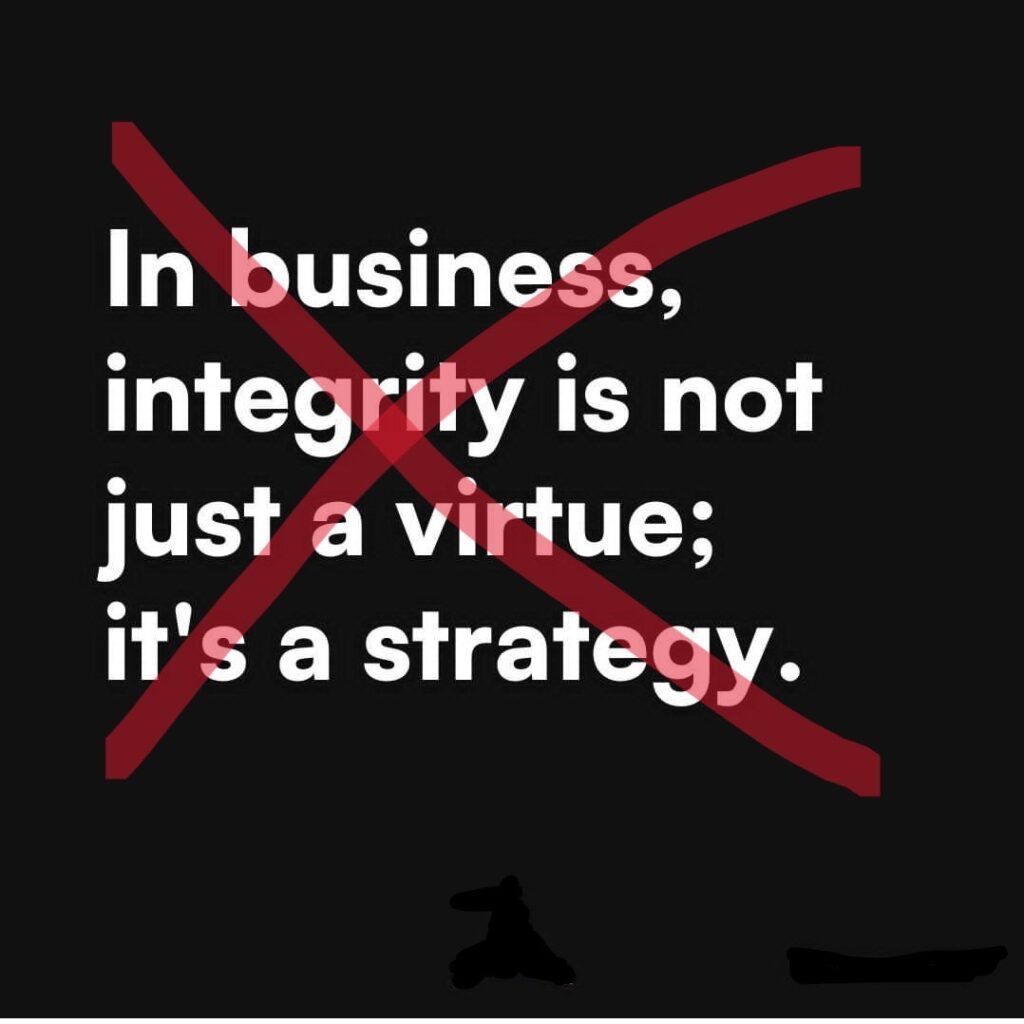What does integrity mean to you? It was a question in an online community I’m part of, and I couldn’t help but join the conversation. I love language exploration and hearing what words mean to others and how they apply them to their lives, as it reveals things about their character just as much as their opinions.
How do you define integrity? What does it mean for you to be in or out of integrity? Is integrity something you even value? Why do you value it? And if not, why not? were some of the further questions posed to the group.
What comes to mind for many is that it means you are who you say you are and do what you say you’ll do. Integrity is synonymous with trust, and trust is vital when it comes to relationships. One member commented that we cannot have integrity if we don’t know who we truly are, which for me feels like an immediate, gut-panging-yes, and that integrity is required — essential even — when it comes to relating to others to communicate clearly and compassionately. My thoughts then turned to whether it is possible to be fully in our integrity if we haven’t answered the call to at least do some exploratory work around knowing our true selves, our values and what we stand for.
The Merriam-Webster defines Integrity as:
- firm adherence to a code of especially moral or artistic values: INCORRUPTIBILITY
- an unimpaired condition: SOUNDNESS
- the quality or state of being complete or undivided: COMPLETENESS

Integrity Versus Personal Integrity
Integrity’s etymology is connected to the word integrate: (v) to fully understand something, to amalgamate, adapt to an environment or standard, to correspond in some essential respect (harmonise, synchronise), (n) the state or quality of being or existence. It’s also connected to integral: being an essential part of a whole, necessary, basic, fundamental, quintessential, having all the parts required to complete. Innate or intuitive to a person or thing.
To have personal integrity, one must have self-awareness, which can be discovered in many ways. One is through a deep exploration of our core values. To “know thyself” and take actions consistent with those values, being principles or standards of behaviour, also defined as moral beliefs or cardinal virtues.
Morality As The Yardstick
One wouldn’t think that the definition of morality isn’t up for debate, but philosophers and psychologists have contested for moons whether morality is objective or subjective. I’m unwavering on the side of objective morality, where principles and values exist independently of individual opinions or cultural norms, where specific actions and beliefs are inherently right or wrong, regardless of context, personal beliefs, or societal expectations.
German philosopher Frederick Nietzsche viewed objective morality as an obstacle to true freedom, and while people should strive for self-mastery, authentic self-expression and a life of creativity and fulfilment, they should not be bound by traditional moral codes. He argued that no universal code of morality can be applied to everyone. While I appreciate Nietszhe’s work, we won’t align on this one.
“Integrity is doing the right thing even when no one is watching” – CS Lewis.
Integrity Has No Agenda
When something is mapped out for the purpose of a strategy, the action is calculated to achieve a specific goal. Look at the military roots of the word strategy and associated words (stratagem: “artifice, trick,” especially in war). This LinkedIn piece points to how so many companies think about marketing strategies:
“…with relentless pressure from stakeholders to increase ROI and aggressive competition vying for attention, achieving true corporate responsibility throughout the organisation can be challenging. Unfortunately for us – but perhaps more importantly for those who trust us – prioritising integrity often gets lost among other strategic priorities and competing company objectives. It’s time we take a stand: marketers must prioritise ethics in order to provide superior services and build trusted relationships with customers now and into the future” (1).
I think the thing we need to take a stand against are virtues and moral states being co-opted into buzzwords and promoted as tactics to deploy or words to weave into your copy to sound edgy, trustworthy and relevant.
The piece then speaks about the importance of ethical marketing strategies and the benefits of prioritising integrity through policies, procedures, and codes of conduct and rewarding good behaviour, as though these create profound change in people. If you’ve worked in corporate and have seen this in action, the rewards often go to those only doing the right thing when someone is watching.

Finding One’s Own Way To Integrity
Integrity has been a potent personal life theme over the past five years after I pulled a thread and proceeded to experience everything I once held dear unravel before me — numerous initiations and dark nights of the ego, one after the other. Experiencing the harmful ways integrity deficits were impacting my life became spirit cries for better and more for myself. Before any of that could change, I’d be summoned to look at how my own perceived integrity fell way short and was ultimately attracting certain situations and people.
In setting this new standard for myself, I inevitably ended up in the house of mirrors, butt-naked under full-scale fluorescent lights. While it’s confronting, to put it lightly, being able to face myself this way was some of the most potent and necessary medicine I could receive. Integrity, to me, is steeped in Truth, living in accordance with objective moral principles, and being incorruptible — as the Miriam Webster definition says— when faced with things that are not.
A cleverly crafted mission statement or conduct code won’t get a person to act right. It comes down to each individual, and integrity can’t possibly “get lost among other strategic priorities” in an organisation if individuals have done the self-work to be radically honest with themselves, and their actions are consistently aligned with values that are unified with objective morality, no matter what the slogan on the wall says.
I sought feedback on this article from my good friend Joel Rafidi, and I’ll finish off with his words:
“My inner contrarian wants to make the argument that integrity is a marketing strategy and there’s nothing wrong with that — and I mean beyond marketing, integrity is a strategy for life. Ultimately if integrity means that I get to have a clearer psyche and develop more trusting relationships and networks, then why shouldn’t it be a strategy one employs with great intention? Mind you, I 100 per cent understand where you’re coming from in the sense that people who actually have very little integrity will parade these words around to try to cover the scent of their own shit. Ultimately, its congruence which leads to longevity, and all houses made of cards will fall”.
(1) The person states this is an edited AI-generated article, which also speaks to the surface-level slosh being programmed into and regurgitated by machine learning.


